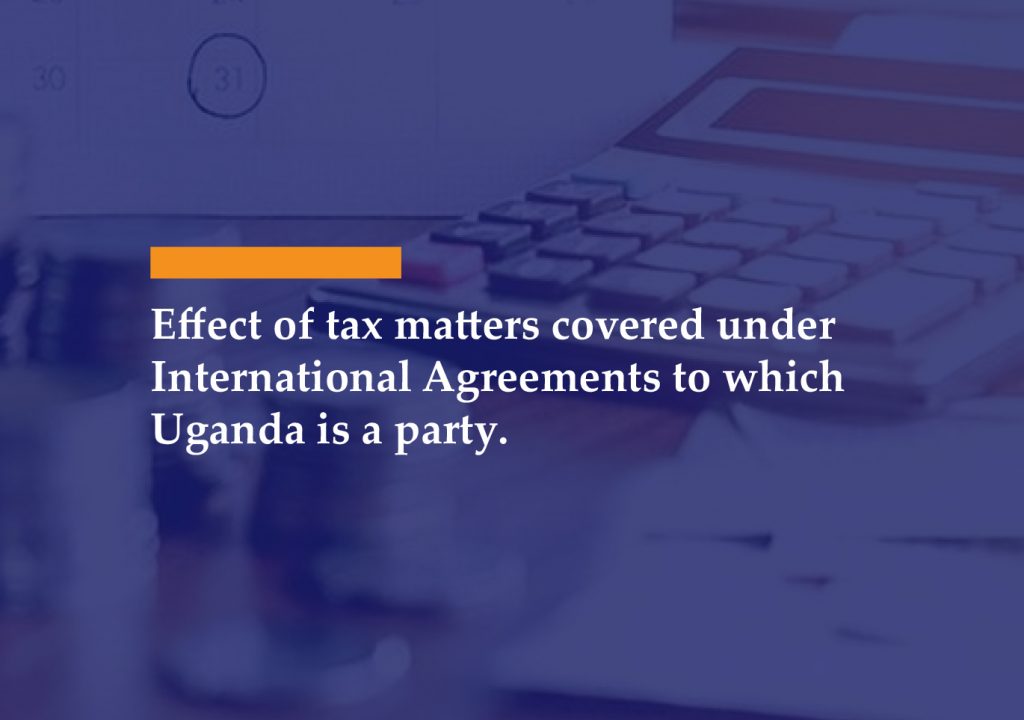Section 88 of the Income Tax Act incorporates international agreements to which Uganda is a party into the Act and provides that in case of any inconsistency, the provisions of the international agreement shall prevail.
Recently the Tax Appeals Tribunal had an opportunity to interpreted the above provision in the case of Airtel Uganda Ltd v Uganda Revenue Authority TAT Application No. 10 of 2019.
Brief Facts
Airtel Uganda Ltd in 2013 acquired 100% of Warid Telecom Limited. Airtel had entered into interconnect agreements with Tata Communications UK Limited and Belgacom International Carrier Services Limited. In 2018 Uganda Revenue Authority (URA) conducted an audit for the period June 2007 to June 2014 and among others adjusted the Withholding Tax (WHT) rate on roaming services from 5% to 15% and issued an additional WHT assessment of UG Shs 208,817,971. The Applicant objected to the assessment which was disallowed by URA and the issue of withholding taxes on roaming services was pursued before the Tribunal among other issues (not relevant to this brief).
Airtel’s Arguments.
Airtel argued that international roaming services are not subject to tax in Uganda under the International telecommunications Regulations (Melbourne 1988) and the International Telecommunications Regulations (Dubai 2012) of which Uganda is a party, which she ratified in 1994 and 2018 respectively. The above regulations provide that where a country levies tax on international services, the tax shall normally be collected only in respect of international services billed to customers in that country. The Applicant argued that the International telecommunication Regulations are international agreements and have effect of law in Uganda as if they have been codified in the Income tax Act and further prevail over the provisions of the Act.
URA’s Arguments.
URA disputed Airtel’s arguments that contending that the International Telecommunication Regulations only establish general principles which relate to the provision and operation of international telecommunication services and does not amount to an agreement under Section 88 of the Act tax on charges on international services shall be billed to customers in the country levying.
Tribunal’s ruling.
On 28th November 2022, the Tax Appeals Tribunal delivered its ruling finding that Airtel was not liable for the additional WHT assessment.
The Tribunal first found that the Dubai Regulations were ratified in 2018 and thus not Applicable to the tax period in question which was between 2007 and 2014. The Tribunal found that both the International telecommunications Regulations (Melbourne 1988) and the International Telecommunications Regulations (Dubai 2012) had a similar provision on taxation of fees charged on international services as stated above. The Tribunal thus set out to determine the issue as to whether the International Telecommunications Regulations (Melbourne) applied to Uganda?
The Tribunal sited Section 88(1), (2) of the Income Tax Act. The Tribunal cited the definition of an international agreement under Section 88(6) of the Income Tax Act and held that paragraph (a) thereof only applied to an agreement between Uganda and a foreign Government. The Tribunal noted that even though the International Telecommunications Regulations may prevent a foreign telecom company from being double taxed, it is not an agreement between Uganda and a foreign government.
The Tribunal proceeded to look at S. 88(6)(b) which provides for bilateral or multilateral agreements with a foreign government, or organisation providing for administrative assistance in tax matters. The Tribunal held that whereas the International Telecommunications Regulations may not be handling tax matters, they provide administrative assistance in tax matters relating to taxation of international telecom companies. That such assistance should not be ignored especially when Uganda is a signatory of an international agreement. The Tribunal emphasized that international agreements should be read in good faith.
The Tribunal held the International telecommunication regulations qualified as an international agreements within the meaning of Section 88 of the Income Tax Act and under subsection (2) thereof took precedence over the provisions of the Income Tax Act. The Tribunal overruled URA’s argument by referring further to Article 27 of the Vienna Convention on the Law of Treaties to emphasise the principle that a party to a treaty shall not invoke the provisions of its internal law as a justification for its failure to perform a treaty.
The Tribunal also held that the international agreements shall prevail over the domestic law.
The Tribunal thus held that URA did not have a justification to issue the additional WHT assessments for the period of July 2007 to June 2014 amounting to Shs 208,817,791 and the assessment was set aside.
Effect of the Ruling
The above ruling is important to taxpayers in Uganda whose services include an international element under an international agreement. The Tribunal has thus interpreted Section 88 of the Income Tax Act to cover not only Double Taxation Agreements but also other multilateral or bilateral agreements with provisions on taxes. This ruling is thus of interest to taxpayers who are covered by some bilateral agreements whose provisions can be used as a justification for not paying taxes and have those agreements prevail over the income tax act except where there is a law that expressly prevail over such agreements.









